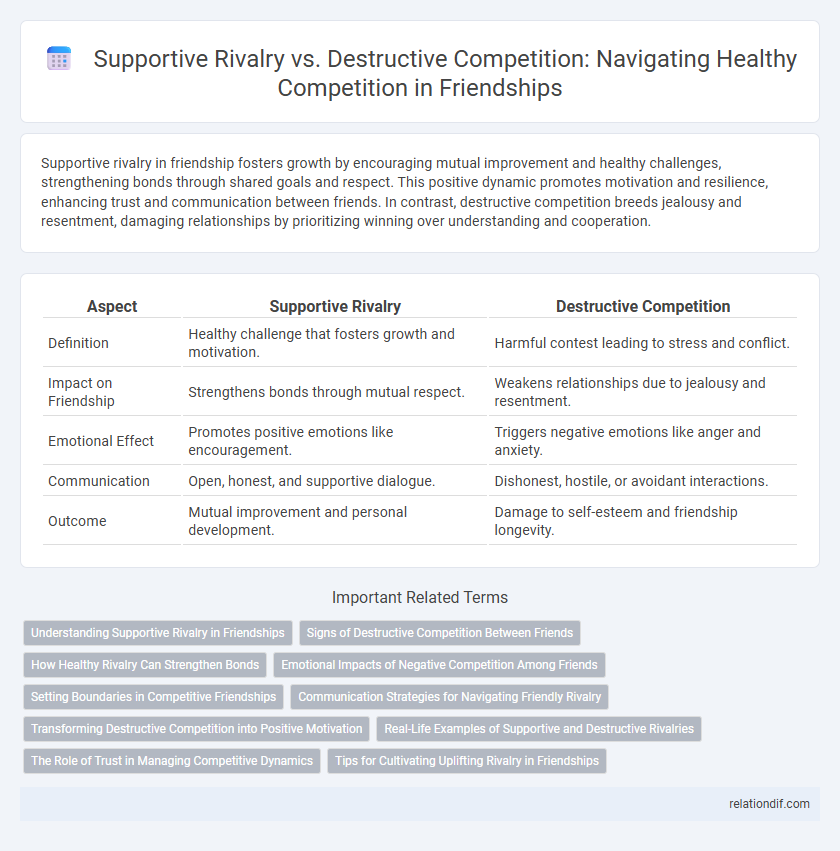Supportive rivalry in friendship fosters growth by encouraging mutual improvement and healthy challenges, strengthening bonds through shared goals and respect. This positive dynamic promotes motivation and resilience, enhancing trust and communication between friends. In contrast, destructive competition breeds jealousy and resentment, damaging relationships by prioritizing winning over understanding and cooperation.
Table of Comparison
| Aspect | Supportive Rivalry | Destructive Competition |
|---|---|---|
| Definition | Healthy challenge that fosters growth and motivation. | Harmful contest leading to stress and conflict. |
| Impact on Friendship | Strengthens bonds through mutual respect. | Weakens relationships due to jealousy and resentment. |
| Emotional Effect | Promotes positive emotions like encouragement. | Triggers negative emotions like anger and anxiety. |
| Communication | Open, honest, and supportive dialogue. | Dishonest, hostile, or avoidant interactions. |
| Outcome | Mutual improvement and personal development. | Damage to self-esteem and friendship longevity. |
Understanding Supportive Rivalry in Friendships
Supportive rivalry in friendships fosters growth by encouraging mutual motivation and healthy challenges that push both individuals to improve. Unlike destructive competition, it builds trust and respect, allowing friends to celebrate each other's successes without envy or resentment. Cultivating understanding in supportive rivalry enhances emotional connection and promotes long-term positive outcomes in the relationship.
Signs of Destructive Competition Between Friends
Destructive competition between friends manifests through constant comparison, undermining achievements, and persistent jealousy that erodes trust and respect. Signs include resentment over each other's successes, passive-aggressive behavior, and lack of genuine encouragement, which damages the foundation of friendship. Recognizing these patterns early helps prevent irreversible harm and promotes healthier, supportive relationships.
How Healthy Rivalry Can Strengthen Bonds
Healthy rivalry fosters mutual growth by encouraging friends to challenge each other while maintaining respect and empathy. This supportive competition builds trust and motivation, reinforcing the foundation of the friendship through shared achievements and constructive feedback. When balanced, rivalry enhances communication and deepens emotional connections, transforming challenges into opportunities for collective success.
Emotional Impacts of Negative Competition Among Friends
Negative competition among friends often leads to emotional distress, including feelings of jealousy, resentment, and diminished self-esteem. This destructive rivalry can erode trust and weaken the foundation of friendship, causing long-term damage to emotional well-being. Supportive rivalry, in contrast, fosters growth and motivation without triggering harmful emotional impacts.
Setting Boundaries in Competitive Friendships
Supportive rivalry in friendships fosters growth and motivation by encouraging mutual respect and clear boundaries, preventing resentment and jealousy. Setting boundaries in competitive friendships involves open communication about limits and expectations, ensuring that challenges remain healthy and do not harm emotional well-being. Maintaining these boundaries helps balance ambition with empathy, preserving trust and strengthening the friendship.
Communication Strategies for Navigating Friendly Rivalry
Supportive rivalry in friendship thrives on open communication strategies that emphasize encouragement and constructive feedback, fostering mutual growth. Effective techniques include active listening, expressing appreciation for each other's strengths, and setting boundaries to prevent resentment. Prioritizing empathy and transparent dialogue helps transform rivalry into a motivational force rather than a source of conflict.
Transforming Destructive Competition into Positive Motivation
Supportive rivalry in friendship fosters growth by encouraging mutual improvement without undermining self-esteem, whereas destructive competition breeds resentment and erodes trust. Transforming destructive competition into positive motivation involves reframing challenges as opportunities for shared success and emphasizing collaborative goals over individual wins. Cultivating open communication and celebrating each other's achievements strengthens bonds and promotes a healthier, more productive dynamic.
Real-Life Examples of Supportive and Destructive Rivalries
Supportive rivalry fosters growth and motivation, exemplified by friends like Steve Jobs and Steve Wozniak, who pushed each other while building Apple. In contrast, destructive competition damages relationships, as seen in cases where jealousy and resentment arise, such as the public feud between professional athletes Serena Williams and Maria Sharapova. Real-life examples demonstrate how supportive rivalries strengthen bonds, while destructive competition leads to emotional harm and fractured friendships.
The Role of Trust in Managing Competitive Dynamics
Trust acts as the foundation in managing supportive rivalry by fostering open communication and mutual respect between friends, enabling healthy competition that motivates growth. When trust is strong, competitive dynamics encourage collaboration and resilience rather than resentment or sabotage. Conversely, lack of trust transforms rivalry into destructive competition, eroding friendship bonds and impairing emotional well-being.
Tips for Cultivating Uplifting Rivalry in Friendships
Supportive rivalry in friendships fosters personal growth by encouraging challenges that motivate improvement without undermining trust. Setting clear boundaries and celebrating each other's achievements cultivate a positive competitive environment that strengthens the bond. Prioritizing open communication and mutual respect helps transform rivalry into a powerful tool for collective success and lasting friendship.
Supportive rivalry vs destructive competition Infographic

 relationdif.com
relationdif.com